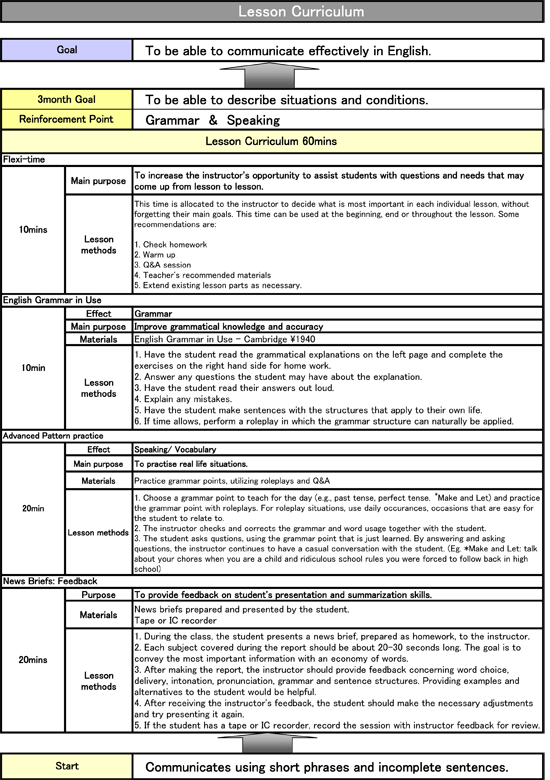Support
The Support Plan is designed to afford both the student and instructor as much support as is feasible to assist the student in achieving their goals. Our focus is not just to satisfy the customer, but rather to amaze them with outstanding service and results.
When joining the Support Plan, students specify their yearly goal, and their current level is tested. 7ACT then analyses and assesses exactly what is necessary for the student to achieve those goals in a one-year period. This will include home study and lesson curriculum.
After 7ACT writes a basic curriculum, the instructor is then contacted and asked for their opinion and input in regard to both the home and lesson programs. A final copy is then to be completed and sent to the student in Japanese and the instructor in English. The instructor is then asked to support the plan to the best of their ability.
Students have the option to purchase additional counseling sessions. In any follow-up counseling sessions, the Counselor meets with the student to listen to any concerns, ideas or changes that may have surfaced. Based on this counseling and the instructor's feedback, they may revise the lessons curriculum and the home study plan that complements it. This is then to be followed by the student and instructor, until the next counseling session.
This has been designed to create minimal burden on instructors, as the extra work is done centrally by professional staff. Students are asked to follow the self-motivation program and to take a minimum of one lesson per week. We believe this will significantly decrease the number of student cancellations.
Process - (10 days to 4 weeks)
Trial Lesson
The staff member explains the two 7ACT Plans immediately before and counsels the student after your 30 minute trial lesson. |
Payment / Start lessons
The student may take lessons at this point according to the regular 7ACT curriculum until the Support Plan curriculum has been sent or given to the instructor. The staff member present at the trial lesson confirms this usually within a week after the trial lesson.
|
Level Check
The student takes an independent lesson check over the phone. They can give you an English copy of their results upon request. |
Curriculum
Our staff customizes a lesson curriculum and home study plan according to the student's needs and level,
and consults the instructor. |
Counseling
Our staff confirms the student's goals, and explains
the curricula. These are then handed to the student,
who will in turn give the English copy to the instructor
at the next class. |
Start Support Plan Curriculum
Please start teaching according to the new curriculum.
The student will now have level checks, counseling and
new curricula designed every three months. It is paramount
that the student follows both the lesson and home study
plan. |
- Example curriculum -

|
| Overall
(30) |
|
|
The
Overall Score of the test represents the ability
to understand spoken English and speak it intelligibly
at a native conversational pace on everyday
topics. Scores are based on a weighted combination
of four diagnostic sub-scores. Scores are reported
in the range from 20 to 80. |
|
28-36 |
|
Test-taker
can manage some slow, short, isolated utterances,
or spoken formulas, but has difficulty following
any native conversation; test-taker may often
pause to search for words and may be difficult
to understand. |
|
| Sentence
Mastery (33) |
|
Sentence
Mastery reflects the ability to understand,
recall and produce English phrases and clauses
in complete sentences. Performance depends on
accurate syntactic processing and appropriate
usage of words, phrases and clauses in meaningful
sentence structures. |
|
31-46 |
|
Test-taker
can understand, recall and produce some English
phrases and clauses in sentence context. Test-taker
produces some simple meaningful sentences. |
|
| Vocabulary
(47) |
|
Vocabulary
reflects the ability to understand common everyday
words spoken in sentence context and to produce
such words as needed. Performance depends on
familiarity with the form and meaning of everyday
words and their use in connected speech. |
|
45-56 |
|
Test-taker
usually understands and can produce everyday
English words when they are used in clear speech. |
|
| Fluency
(20) |
|
Fluency
reflects the rhythm, phrasing and timing evident
in constructing, reading and repeating sentences. |
|
20-37 |
|
Test-taker
speaks in a slow manner with hesitations, false
starts, long pauses, and/or omissions. Spoken
words are often not linked and/or not grouped
according to their sense. |
|
| Pronunciation
(28) |
|
Pronunciation
reflects the ability to produce consonants,
vowels and stress in a native-like manner in
sentence context. Performance depends on knowledge
of the phonological structure of everyday words. |
|
25-37 |
|
Test-taker
mispronounces many consonants and vowels, resulting
in a strong, intrusive non-English accent. Listeners
may have difficulty understanding a significant
portion of the words. Stress placement is often
unclear, and syllables may sometimes be added
or skipped. |
|
|
Lesson Only
Students under this system will continue to take lessons according
to the standard 7ACT curriculum. Adjustments may be made to
the standard curriculum to better suit the students level,
needs and goals. If radical changes are to be made, please
make sure you have the student's permission and inform the
7ACT office.
|


